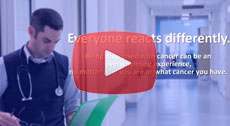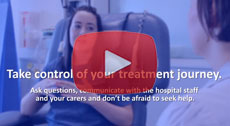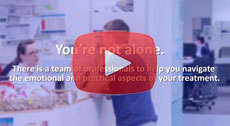Skin cancer
On this page
The majority of skin cancers are caused by overexposure to ultraviolet (UV) radiation from the sun.
There are three main types of skin cancer:
- basal cell carcinoma
- squamous cell carcinoma
- melanoma
Basal cell carcinoma and squamous cell carcinoma are known as non-melanoma skin cancers and are the most common type of cancer in Australia. Most are not life-threatening.
Melanoma is the most dangerous form of skin cancer. It usually starts in the skin, either in a mole or in normal-looking skin (about half of all melanomas start in normal-looking skin). It’s important to find and treat melanoma as early as possible.
View Cancer Council Australia information on:
Patient stories
(Disclaimer: All patient stories are based on real life experiences as told to us. The stories are portrayed by actors to protect privacy and confidentiality.)
Treatments
Radiation therapy
What is radiation therapy?
- Radiation therapy is the use of high energy x-rays (called ionising radiation) to treat cancer.
Managing side effects
We’ve created some short videos to help you understand the radiation therapy process. Be sure to ask you treatment team for more information if you have any questions or concerns.
Chemotherapy
What is chemotherapy?
- Chemotherapy is a term for a large number of drugs with different methods of working and different side effects. It is used to improve the chance of cure or to control the growth of cancer cells.
Managing side effects
- Advice on managing potential side effects of chemotherapy treatment.
We’ve created some short videos to help you understand the chemotherapy process. Although these have been filmed at the Royal Brisbane and Women’s Hospital you will go through a similar process at other facilities.
Coming for your chemotherapy
There are a number of things you’ll need to know for you first visit for chemotherapy. Your doctor will review any tests and scans and discuss your diagnosis and treatment options with you. Don’t forget to bring your scans and test results. You’ll also need a blood test before each visit. This video shows a typical session at the Royal Brisbane and Women’s Hospital, but you will go through a similar process at other facilities.
Hello, and welcome to Cancer Care Services.
You’re here to begin your journey for the treatment of your cancer.
On your first visit, the doctor will review any relevant tests and scans, and discuss your diagnosis with you and what the best treatment options are.
You will need to bring any scans you have had to this appointment.
You will need to have a recent blood test before having your chemotherapy each time. This can be done at Sullivan and Nicolaides, QML, or your local hospital on the day prior to coming for treatment.
If you need to have your blood collected on the day of your doctor’s appointment, this will need to occur one to two hours prior to your appointment for the results to be ready for the doctor to review.
It is best to speak with the nurse or doctor regarding the best process for blood collection at your treating unit.
Once your blood results are available, the doctor can review them to determine if your treatment can go ahead.
Your doctor will discuss the results with you at your appointment and check that you are well before treatment can go ahead.
If everything is OK, the doctor will prescribe the chemotherapy orders.
The chemotherapy order is delivered to the pharmacist to check in clinic, and then again in pharmacy.
At most facilities in Metro North, the chemotherapy is ordered and delivered to the pharmacy from an
external company pre-made.
Some chemotherapy is very expensive, or has a short stability and needs to be made up on the day of treatment. This varies at different facilities and can take some time, as there are a number of checks that need to occur to ensure the right treatment is being made to the right patient.
These checks also occur for the pre-made treatments, as there is a requirement for two pharmacists to be available to perform the checks.
After you have finished with the doctor, you will be called in for your treatment appointment.
Depending on the number of patients attending on the day, or if there are any emergent treatments, there may be a delay between the doctor’s appointment and the treatment appointment.
Every attempt is taken to minimize this delay.
Your chemotherapy treatment
This video shows a typical chemotherapy treatment session at the Royal Brisbane and Women’s Hospital, but you will go through a similar process at other facilities. You will learn about the process and the safety procedures we use to make sure your treatment is as effective and safe as possible.
If you are a new patient, you will be taken through to have your one-on-one education session prior to your treatment to ensure you understand everything about your treatment, any side effects, and how to manage them. This is a great time to ask questions and discuss any concerns you have with your nurse.
When you are ready, the nurse will take you to the treatment chair or bed and set you up for treatment.
This will mean putting a drip in your arm, or if you have a device, connecting the fluid lines.
The nurse will take your temperature and perform an assessment to make sure you are OK for treatment.
Usually you will have some drugs to help stop nausea before your chemotherapy. Most of the time, these are given through your drip. But sometimes these are oral medications.
When the chemotherapy is ready, the nurse will put on a special gown, gloves, goggles, and mask before they give you the chemotherapy. This is to protect the nurse from exposure to the drugs.
The chemotherapy is good to treat someone with cancer, however, it can cause cancer or affect fertility if the nurse is exposed.
The protective equipment might look a bit scary, but it’s necessary to protect the nurses. And other precautions are taken to protect visitors and the public.
Before the chemotherapy is given, two nurses are required to check the drugs and will ask you your name and date of birth and check your identification band prior to giving you the treatment. This is necessary to ensure the right patient gets the right treatment.
When the chemotherapy is running, it is important to let the nurses know if there is any stinging or burning at the drip site, or if you feel anything out of the ordinary, as this might be a sign of a reaction. This can occur from time to time depending on the drums you are having, so please let the nurses know immediately if this happens to you.
When the chemotherapy is completed, the nurses will put on their protective clothing again to disconnect you and dispose of the equipment in a special bin.
It is important that you collect any medications the doctor has ordered for you to take home. These are usually tablets and stop you feeling sick after the chemotherapy, or may be a part of your chemotherapy treatment. The pharmacist will explain how and when to take them.
You will also need to ensure you have your appointment and blood tests slip for your next treatment before you leave. Or at some facilities, it may be necessary to post your appointment to you. Speak to your nurse before you leave.
If you have any difficulties in the days after your treatment, please contact your treating area during business hours.
Or if it is more urgent or out of hours, go to your nearest emergency department.
For further information regarding your treatment, please refer to other videos and resources on the Patient Portal, or speak with any member of our Cancer Care team.
Surgery
Sometimes surgery is the most effective approach for a particular type of cancer. Your doctor will discuss this with you as part of your treatment.
Other treatments, such as chemotherapy or radiation therapy, can be given before, during or after surgery.
Surgery is a medical treatment performed by a surgeon or a surgical oncologist to remove cancer from the body or repair a part of the body affected by cancer. It’s sometimes called an operation.
Cancer Council Australia resources
Targeted therapies
Targeted therapy uses drugs to kill or slow the growth of cancer cells. The treatment works by selectively targeting particular types of cancer cells while minimising harm to normal, healthy cells.
Targeted therapies can be used for different reasons and may be used instead of, or in combination with chemotherapy. Not all cancers respond to targeted therapies, and some of these therapies are only available in clinical trials.
Cancer Council Queensland resources
Supporting your treatment
As part of your cancer journey you may see one or more of our Allied Health professionals.
Cancer research
Cancer care Services has an active research program through our collaboration with a range of world-class research organisations.
QIMR Berghofer
QIMR Berghofer is one of Australia’s most successful medical research institutes and conducts extensive research on different cancer types. Metro North HHS and QIMR Berghofer partner on a range of cancer studies through our hospitals and our membership of Brisbane Diamantina Health Partners.
Brisbane Diamantina Health Partners
Brisbane Diamantina Health Partners is an academic health science network. Its members include hospital and health services, primary care, universities and medical research institutes who collectively take local and international research and accelerate its application to new treatments across the spectrum of health care.
Herston Imaging Research Facility (HIRF)
Located at the Royal Brisbane and Women’s Hospital, HIRF has been purpose-built to facilitate imaging research and clinical trials. Its state of the art clinical scanners and prime location within Australia’s largest hospital precinct position it as a leading global force in clinical imaging research.
Australian Cancer Research Foundation
The Australian Cancer Research Foundation provides news, information and leading opinions on treatment, prevention, diagnosis and cure.
Clinical trials
Clinical trials test new treatments to find better ways to prevent, detect or treat disease. Both healthy people and people with a disease or condition can volunteer to be part of a trial.
Cancer Care Services participate in a range of clinical trials at our hospitals. For information about any of the trials below, ask your doctor or nurse.
For information about clinical trials in general visit the Australian Clinical Trials website or search the Australia and New Zealand Clinical Trials Registry.
Support groups and resources
Skin cancer specific
Support for carers
Aboriginal and Torres Strait Islander people
General support groups
- Cancer Connections
- CanSpeak Qld
- Canteen
- Headspace – wellbeing for 12-25 year olds
- Leukaemia Foundation
- Look Good Feel Better
- Mummy’s Wish
- PalAssist (Palliative Care Assistance)
- Palliative Care Australia
- Rare Cancers Australia
- Redkite
Information and advice
- Cancer Care Services Resources page
- Advance Care Planning Australia
- Cancer Australia
- Cancer Council
- Macmillan Cancer Support (UK site)
- Cancer.Net (US site)
- eviQ Cancer Treatment Protocols Online (including drug protocols and other resources)
Member access
Username: MNCCS
Password: patient




